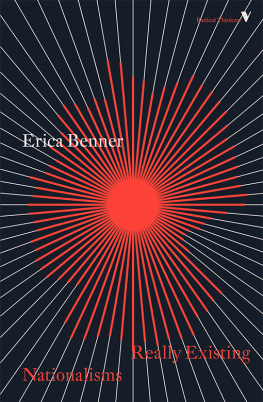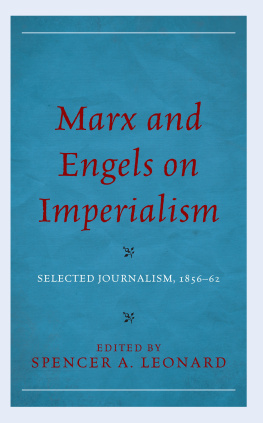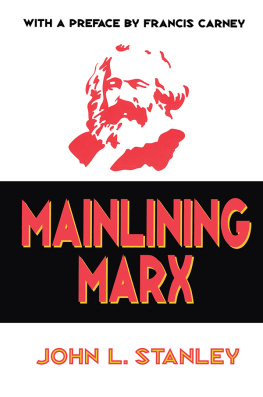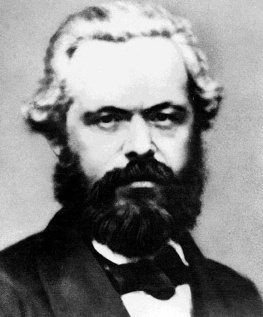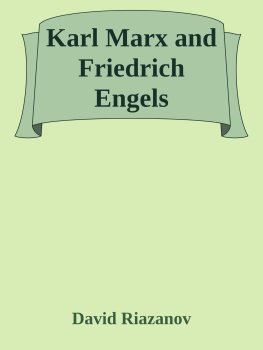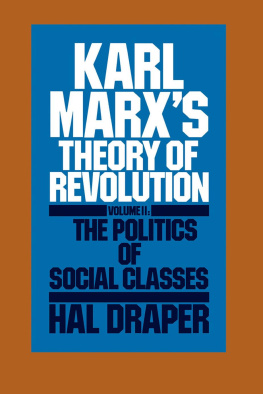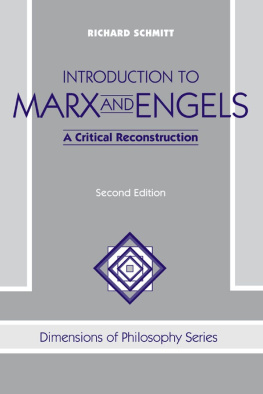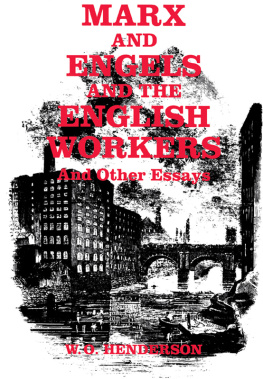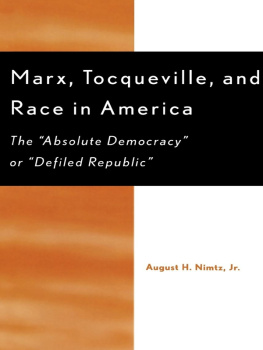REALLY EXISTING
NATIONALISMS
A Post-Communist View from
Marx and Engels
ERICA BENNER

This paperback edition published by Verso 2018
First published by Oxford University Press 1995
Erica Benner 1995, 2018
All rights reserved
The moral rights of the author have been asserted
1 3 5 7 9 10 8 6 4 2
Verso
UK: 6 Meard Street, London W1F 0EG
US: 20 Jay Street, Suite 1010, Brooklyn, NY 11201
versobooks.com
Verso is the imprint of New Left Books
ISBN-13: 978-1-78663-478-8
ISBN-13: 978-1-78663-479-5 (UK EBK)
ISBN-13: 978-1-78663-480-1 (US EBK)
British Library Cataloguing in Publication Data
A catalogue record for this book is available from the British Library
The Library of Congress has Cataloged the First Edition as Follows:
Benner, Erica.
Really existing nationalisms : a post-communist view
from Marx and Engels / Erica Benner.
Includes bibliographical references.
1. Nationalism and communism. I. Title.
HX550.N3B47 1995 320.54dc20 9520276
Printed and bound by CPI Group (UK) Ltd, Croydon, CR0 Y44
Acknowledgements
This book began life as a doctoral thesis written at Oxford University, where I benefited from the advice and support of many good people. My heartiest thanks are due to Mark Philp, whose calm lucidity saw this work through more peaks and troughs than I care to remember. Benedict Kingsbury and Steven Lukes encouraged me to pursue this topic at a time when others winced at the prospect of yet another volume on Marx. G. A. Cohen, David Miller, Adam Roberts, and the late John Vincent read early drafts of my work, making many helpful comments. Fred Halliday and Andrew Hurrell read most of what appears here. I am grateful for their criticisms and for the kinder things they had to say, and have tried to take the former into account in writing this final version. Two anonymous readers for Oxford University Press made some very shrewd remarks which I have also tried to address, although Im aware that the result may still fall short of their expectations. Tim Barton, Dominic Byatt, and Anna Zaranko at Oxford University Press dealt patiently with my long-distance queries from Warsaw, while Janet Moths meticulous copy-editing ironed out some of my inconsistencies and stylistic quirks. I also want to thank Avi Shlaim, who boosted my morale on several occasions and offered valuable advice about publication.
Although I never inflicted any proof-reading tasks on my friends, this book could not have been written if they hadnt been there. Much-appreciated moral support came at various times from Leticia lvarez, David Cohen, Lakshmi Daniel, Peter Muller, Masa Okano, Andreas Osiander, Jrme Pelletier, Regina Rowland, Mnica Serrano, Naoko Shimazu, Steve Welch, and Geoff Wiseman. A special round of thanks must go to Hawon Jang, whose warm friendship and word-processing skills helped to pull this work through at a critical moment.
Many of the arguments in my final chapter were sharpened through discussions with my husband, Brice Couturier. His strong convictions and often fierce disagreements forced me to think harder than I would have done without him; and his company made the scholarly life much sweeter.
My mother, Gretchen Benner, encouraged my efforts from start to finish. This book is dedicated to her and to the memory of my father, P. D. Benner.
Contents
| CCHP | Marx, A Contribution to the Critique of Hegels Philosophy of Law, in MECW 3: 5129. Referred to in the text by the more usual translation of the title, the Critique of Hegels Philosophy of Right. |
| CM | Marx and Engels, Manifesto of the Communist Party, MECW 6: 477519. |
| CSF | Marx, The Class Struggles in France: 1848 to 1850, in David Fernbach (ed.), Surveys From Exile (Harmondsworth: Penguin, 1981), 35142. |
| CWF | Marx, drafts of the Civil War in France, MECW 22: 435551. |
| EB | Marx, The Eighteenth Brumaire of Louis Bonaparte, MECW 11: 99197. |
| EPMS | Marx, Economic and Philosophic Manuscripts of 1844, MECW 3: 22948. |
| GI | Marx and Engels, The German Ideology, MECW 5: 19339. |
| GR | Marx, Grundrisse, trans. Martin Nicolaus (Harmondsworth: Penguin, 1974). |
| IWA | International Working Mens Association |
| JQ | Marx, On the Jewish Question, MECW 3: 14874. |
| MEAW | Marx and Engels, Ausgewhlte Werke in Sechs Bnden (Berlin: Dietz Verlag, 1972). |
| MECW | Marx and Engels, Collected Works, 35 vols. (130, 405) (London: Lawrence and Wishart, and Moscow: Progress Publishers, 1975 ). |
| MEI | Marx and Engels, Ireland and the Irish Question. (London: Lawrence and Wishart, 1978). |
| MEOC | Marx and Engels, On Colonialism (Moscow: Progress Publishers, 1976). |
| MESC | Marx and Engels, Selected Correspondence (Moscow: Progress Publishers, 1975). |
| NRZ | Neue Rheinische Zeitung |
| NYDT | New York Daily Tribune |
| RCR | Engels, Revolution and Counter-Revolution in Germany, MECW 11: 396. |
THE working men have no country. We cannot take from them what they have not got. For generations of Marxists this phrase, coined a century-and-a-half ago, remained the cornerstone of any acceptably revolutionary understanding of nationalism. In a postcommunist world riven by ethnic and national conflicts, Marx and Engels words are invokedif they are remembered at allonly as an epitaph on one of the socialist movements most debilitating errors.
Marx and Engels failure to develop a systematic theory of nationalism is well known. The authors of the Communist Manifesto did produce what amount to volumes of writings on the national movements of their own day; and they were acutely aware that such movements might either advance their revolutionary project or thwart it, corroborate their theory of historical change or call its deepest premisses into question. But the polemical style of many of these writings has led some commentators to dismiss them as mere hackwork infused, perhaps, with an admirable strain of political realism but stillin the words of a contemporary authordevoid of theoretical interest. Theoretical neglect appears a more damaging charge when it is linked with that of practical misjudgement. Marx and Engels expectation that nationalism would cease to exert a divisive influence in an era when the mass of people were increasingly alienated from the ruling representatives of their nation-states, and where capitalism was thought to be eroding old ethnic and national particularisms, has been confounded by events not readily explicable in terms of classical Marxist theory.
These considerations have led erstwhile socialists and their critics in the western world to reach a most unusual consensus:
This work seeks to modify that image by clarifying the theoretical basis of Marx and Engels thinking on national issues. But I should make it clear that the argument developed here is not intended to support an insular Marxist understanding of nationalism. Such an endeavour would, in all likelihood, be denied even a tepid welcome today, especially in those parts of the world where nationalism has recently helped to topple communist regimes which claimed Marx as their progenitor. My This enables me to propose a different reading of what the two men wrote on the subject, and to identify some neglected strands of thought that are less easy to dismiss than the views usually attributed to them.

